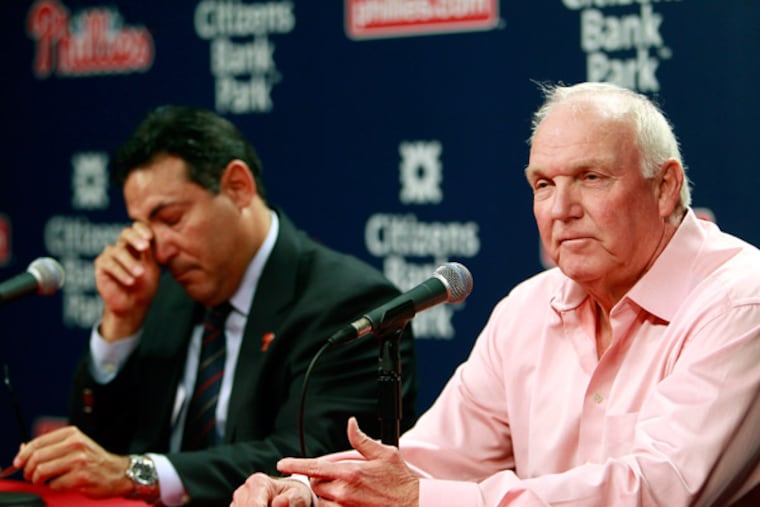Manuel pays for Amaro's mistakes
When it was time for Ruben Amaro Jr. to announce that manager Charlie Manuel had been fired by the Phillies, the general manager became emotional as he delivered the official goodbye.

When it was time for Ruben Amaro Jr. to announce that manager Charlie Manuel had been fired by the Phillies, the general manager became emotional as he delivered the official goodbye.
"I just want to say this," Amaro said as his voice grew thick and halting. "You people may not know the relationship I've had with Charlie. He's a special person. This is difficult for me. I hope he stays in our organization."
Amaro had good reason to regret the way the change went down, because the team's front office had a lot to do with Manuel not being able to finish out his contract with more dignity than can be conferred in a hastily called August afternoon news conference.
Some of what happened to the Phillies this season was simple bad luck as far as the injuries that put large holes in the roster, but some of it was also the result of wishful thinking that those injuries could be avoided.
Part of the failure was because the front office, not for the first time, didn't assemble a competent big-league bullpen or a good enough bench or find the right mix of position players to mortar the gaps around the aging core of the team.
The Phillies came back from the all-star break with a .500 record but went immediately into the tank. It wasn't pretty. Players were getting sloppy and unfocused at their jobs and the burning desire to win every night became replaced by the smoldering ash of a locker room that began to accept and anticipate losing.
When that happens, the manager has to go, and Manuel gets that part better than anyone else. He met with Chase Utley (a coupling of pragmatic baseball men if ever there was) before Friday's news conference, and told Utley the change wasn't any surprise given the team's recent play.
"I just got done telling [Utley] in there, 4-19 ain't good, that ain't good at all," Manuel said. "We're not talking 4-8 or 4-6 or 4-7. We're talking about 4-19, and the people that made the decisions, believe me, I understand them. Do I like them? No, I don't like them. But at the same time . . . they think they're doing the best they can for our club."
He couldn't keep the team together when it started to come apart, but he wasn't the reason it came apart. The man sitting next to him on the dais, sincerely overcome that it came to this, bears a far greater responsibility.
It was obvious the organization intended this to be Manuel's last season, anyway. He will be 70 in January and the team was headed for an inevitable rebuilding that requires the cliché of putting a new face and a new voice in charge.
There was never a hint the Phils would extend his contract, and if he then drifted into some nebulous roving-minor-league-hitting-instructor role, it would be the kind of graceful semiretirement the team preferred. What happened on Friday was far from it.
Amaro said the team needs to turn the page and look toward the future, even though he is unable to really do that with the players in his locker room. If the team's ancient nucleus had been disassembled, then making a logical argument for a new manager in 2014 would have made more sense.
That isn't the case, however. The Phillies signed Utley to a two-year extension. Moving past Ryan Howard is impossible because of his contract. Jimmy Rollins refuses to entertain a trade. Carlos Ruiz will be a free agent, but the farm system hasn't produced a replacement. Roy Halladay intends to try it again in another display of hope over history. Exactly what page is being turned here, aside from the one that bears the picture of Charlie Manuel?
"I think those core players are still talented. They can help us get back to being a championship-caliber club," Amaro said. "Charlie and I talked a lot about what he brings to the table. And, yes, I agree with him. I think he can manage another two to three years, but we are in a transition phase and . . . we're looking to the future. Not just one or two years out, but four and five and six years out. I think this is a decision we made because we feel it's time to put someone in that position [who] will be able to handle that post for the foreseeable future."
Reasonable enough on the surface, as Amaro always is, but that had nothing to do with what happened on Friday. The future arrived as abruptly as it did because Amaro and the front office gave Manuel a team that wasn't good enough and was littered with enough mercenaries and half-talents that it finally quit on him.
That was a good man who walked slowly out of the ballpark in the middle of the afternoon on a beautiful day for baseball. He deserved better, but the game doesn't always give you what you deserve. It gives you what you get. No hard feelings. In fact, usually no feelings at all.
Friday was a little different in that way. Everybody felt this one.